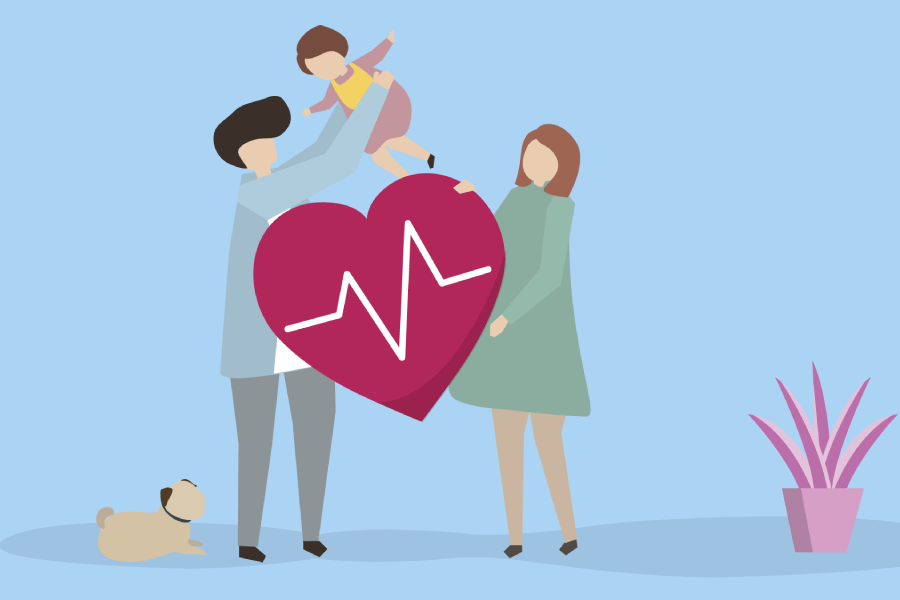
The birth of your child marks a special joy in your life and opens up a whole new world for you. At times, however, taking care of a newborn can be a little daunting, particularly for the first time mothers. Bonding, perhaps one of the most pleasurable aspects of infant care, occurs during the sensitive period in the first hours and days after birth when parents make a strong bond with their infant. Physical closeness may foster an emotional bond. For children, attachment leads to their emotional growth, which also influences their development in other fields, such as physical growth.
Another way to think of bonding is to “falling in love” with your child. Children thrive on having a parent or other adult in their lives who loves them dearly. Start by cradling your child and softly stroking him or her in various patterns. parents should also take the opportunity to be “skin-to-skin,” to keep your baby against your own skin as you feed or cradle. Babies usually enjoy voice sounds, such as talking, babbling, singing, and cooling. Your baby is probably going to enjoy listening to music, too.
Baby rattling and musical cell phones are other effective ways to enhance your baby’s ears. If your little one is upset, try humming, reciting poems and nursery rhymes, or reading aloud while you swing or gently rock your baby in a chair. Some babies may be particularly sensitive to touch, light, or sound, and may start and cry quickly, sleep less than expected, or turn their faces away when someone speaks or sings to them. If this is the case with your kids, keep the noise and light levels low to moderate.
Swaddling, which works well for certain babies in the first few weeks, is another calming method that first-time parents can learn. Proper swaddling holds the arms of the infant close to the body while allowing some movement of the legs. Not only does swaddling keep a baby warm, but it appears to give most newborns a sense of protection and warmth.
Did you know that it can also lead to brain damage by shaking your baby? Shaking her will not help you achieve the target, whether you try to put her to sleep or just console her. Just rock her softly from side to side and sing a lullaby instead. Know that the knowledge of the transition from the womb to the world must be absorbed by your infant.
This will help her feel your warmth and also be closer to the mother’s heart to make it easier to give her sufficient skin-to-skin touch. The only sound she heard in the womb was your heart beat, so holding your baby tight to your heart and providing ample skin-to-skin contact will make her feel better and calm her senses.
Clean and sterilise food bottles at least twice a day. Don’t forget to do the same for the pieces of your breast pump that can be sterilised. Don’t forget about the teats. If necessary, wash thoroughly before each feed. A part of the umbilical cord of your newborn baby will be attached to it for at least 10 days or up to three weeks after birth.
It’s a delicate area for your kid, and it’s imperative to take care of it. Apply the medicated powders recommended by your doctor to keep the area dry and help you recover faster. Have your child wear loose clothes to prevent any pressure on the place. When it dries and falls, continue the treatment routine until the area is fully healed.
Keep all accessories, pillows and soft toys off your baby’s bed or sleep area as a thumb rule. If your baby breathes, the fur from the soft toys can lead to a respiratory condition or allergy; it can also lead to SIDS. Keep pillows and toys away from the sleep zone of your baby to prevent suffocation or other accidents.
Keep the shiny cleanness of your baby’s room and ensure that you keep the baby out of the room while doing all the cleaning and washing. This will allow the baby to get rid of airborne allergens and infections. There’s a misunderstanding about doing the rounds that making your kid weep is beneficial for the baby’s lungs. Though weeping is often considered a significant physiological activity, holding your baby in tears is irresponsible. This could contribute to mental distress. Actually, note that crying is the way a baby shows you that something has gone wrong with the baby. Check carefully for the signs to ensure that you can take care of baby needs.
Join Master Parenting Classes for baby’s right future.
